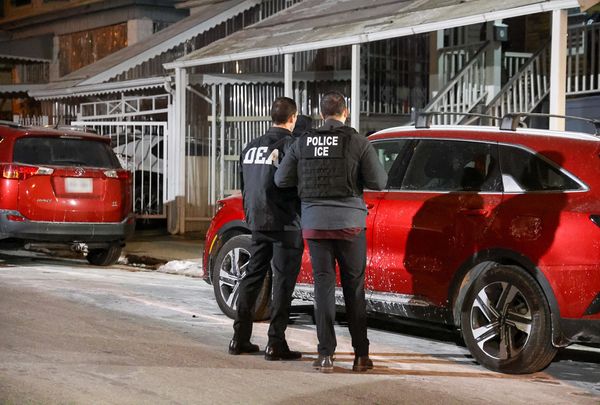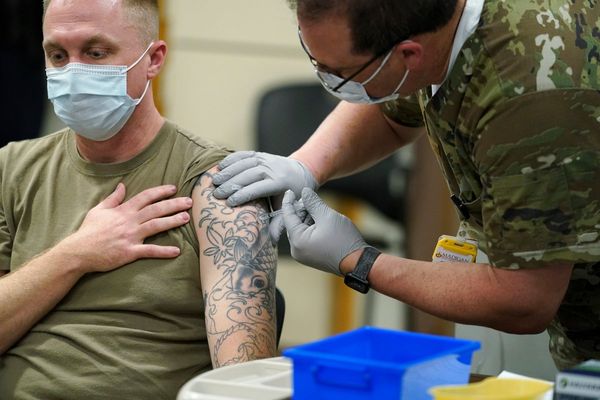
Gun reform advocates have decried as “absolute insanity” a move by a North Carolina sheriff to arm his school resource officers with assault rifles on campus – in addition to their service issue handguns.
Madison county sheriff Buddy Harwood says he felt obliged to act in hope of preventing another massacre such as the one at Robb elementary school in Uvalde, Texas, in May that killed 19 students and two teachers.
“Systemic failures” by law enforcement, one report into the murders found, included a lengthy delay in heavily armed officers confronting the gunman, who was shooting with an AR-15-style, high-power assault rifle.
“Having just a deputy armed with a handgun isn’t enough to stop these animals,” Harwood said in a video statement he posted to Facebook in June.
“My school resource officers will not have to wait, retreat, or have to leave the situation to get the weaponry to deal with that threat.”
A subsequent report by WLOS News claimed Harwood received “mostly positive feedback” from the public for his stance, which will provide for the military-style weapons to be locked in undisclosed locations in each of the county’s three elementary, one middle and two high schools.
But opponents have accused the sheriff of sacrificing safety to play to the interests of the gun lobby.
“I think it is absolute insanity. This won’t save a single child, or stop a single unknown and potential future act of violence,” said Fred Guttenberg, whose 14-year-old daughter Jaime was among 17 killed in Parkland, Florida, in February 2018 in the nation’s deadliest high school shooting.
“However, it will immediately help to sell more guns and make this sheriff more popular with the gun lobby that he is hoping to be a champion with,” added Guttenberg, a prominent gun safety advocate and senior adviser to Brady, the gun control campaign group.
Nationally, there has been vocal debate about beefing up campus security versus a focus on weapons control measures as the most effective way of tackling gun violence perpetrated in schools.
In the aftermath of the Parkland mass shooting, Florida explored both avenues, initially passing sweeping reforms that included an increase in the minimum age to buy a weapon from 18 to 21, a move that was immediately challenged by the National Rifle Association (NRA).
More recently, however, school safety measures in the state have focused on elements including mental health and enhancements to campus security rather than restricting access to firearms.
Reformists argue that stronger gun laws, and not further weaponizing educational premises, would be the most effective solution.
“The rise of school shootings across the country should concern us all, but arming school resource officers with AR-15s will only make our children less safe,” Kris Brown, president of Brady, told the Guardian.
“There is no evidence that an officer armed with an AR-15 is more likely to stop an active shooter. An AR-15 is nearly three times more powerful than a typical handgun [and] already we’ve seen instances of school resource officers unintentionally discharging their weapons.
“In Highland Ranch, Colorado, a security guard’s handgun shot through a wall and injured two students. Had that weapon been an AR-15, there could have been even greater casualties,” Brown said.
Brown said Sheriff Harwood’s approach was “misguided and dangerous”.
“[It] could have deadly consequences. Our future generations deserve evidence-based solutions to keep them safe in the classroom, solutions like life-saving gun laws.”
In June, Joe Biden signed the most sweeping package of gun reform measures in decades that included tighter background checks and strengthening “red flag” laws to remove weapons from those adjudged to be dangerous.
In Uvalde, as in Parkland, authorities missed, or ignored, multiple warning signs indicating the teenage shooters were becoming a threat.
“Lives will be saved,” Biden said during the signing ceremony at the White House, though the president acknowledged the bipartisan compromise bill “doesn’t do everything I want … I know there’s much more work to do.”
It fell short of his stated wish to ban access to assault weapons for the general public.
In North Carolina, meanwhile, activists blame politicians’ reluctance to act for provoking Harwood into a policy of placing assault-style weapons closer to pupils.
“It’s disturbing that state lawmakers’ abject failure to pass common-sense gun safety laws has forced schools to even consider such dangerous and militaristic measures,” said Lee Ann Kelley, a volunteer with the North Carolina chapter of the campaign group Moms Demand Action.
“There is a concerning lack of detail about the training, storage, and safety guardrails associated with this policy.
“Instead of further militarizing schools and exacerbating the harm done to students of color who are already negatively impacted by the presence of [armed] school resource officers, policymakers should work to implement policies that will actually keep guns out of kids’ hands and keep our schools safe,” she added.







